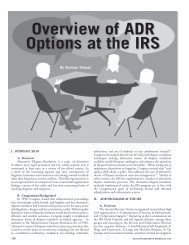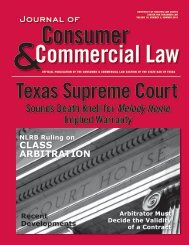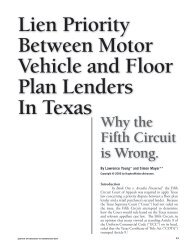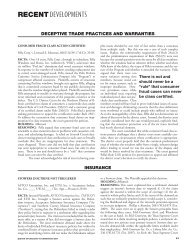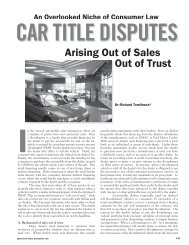Teaching Consumer Credit Law in an Evolving Australian Economy
Teaching Consumer Credit Law in an Evolving Australian Economy
Teaching Consumer Credit Law in an Evolving Australian Economy
Create successful ePaper yourself
Turn your PDF publications into a flip-book with our unique Google optimized e-Paper software.
the conduct offends the public’s senses, <strong>an</strong>d 5) the culpability of<br />
the offender. 69 Ultimately, the amount of damages to which a<br />
party is entitled is left to the jury. 70 Further, reckless behavior by<br />
a debt collector, coupled with a show<strong>in</strong>g of proximate cause c<strong>an</strong><br />
support <strong>an</strong> award for mental suffer<strong>in</strong>g. 71 Also, <strong>in</strong> addition to the<br />
common law tort for wrongful debt collection, a violation of the<br />
TDCA’s is automatically a violation of the Texas Deceptive Trade<br />
Practices Act 72 (“DTPA”), which entitles a consumer to mental<br />
<strong>an</strong>guish damages <strong>an</strong>d treble economic damages if the offender<br />
acted know<strong>in</strong>gly, <strong>an</strong>d both treble mental <strong>an</strong>guish <strong>an</strong>d economic<br />
damages if the offender acted <strong>in</strong>tentionally. 73 Further, a dispute<br />
over the degree of culpability is enough to survive a motion for<br />
summary judgment <strong>an</strong>d proceed to trial to resolve the <strong>in</strong>tent<br />
issue. 74 In Household <strong>Credit</strong> v. Driscol, 75 the court held even if a<br />
debt collector stops abusive conduct after a consumer compla<strong>in</strong>s,<br />
evidence of prior conduct is factually sufficient to f<strong>in</strong>d gross or<br />
reckless conduct. 76 The ultimate correction of the error does not<br />
excuse a debt collector’s previous compound<strong>in</strong>g of the problem. 77<br />
In short, Texas law specifically contemplates consideration of the<br />
degree of culpability of <strong>an</strong> offend<strong>in</strong>g debt collector – <strong>an</strong> element<br />
notably absent from the FDCPA.<br />
Modern Methods of Evad<strong>in</strong>g Debt Collection <strong>Law</strong>s <strong>an</strong>d Possible<br />
Remedies<br />
Deregulation of the credit <strong>in</strong>dustry, result<strong>in</strong>g largely from<br />
the Supreme Court’s decisions <strong>in</strong> two import<strong>an</strong>t cases effectively<br />
nullify<strong>in</strong>g state usury laws, 78 enables subprime borrowers to easily<br />
obta<strong>in</strong> credit, <strong>an</strong>d high risk borrowers (<strong>in</strong>clud<strong>in</strong>g m<strong>in</strong>orities,<br />
rural, poor, <strong>an</strong>d elderly consumers 79 ) are often the targets of<br />
deceptive debt collection practices. 80 And, more <strong>an</strong>d more debt<br />
collectors are us<strong>in</strong>g creative tactics to m<strong>in</strong>imize the effectiveness<br />
of the FDCPA. 81 The FDCPA has simply become <strong>in</strong>effective<br />
<strong>an</strong>d <strong>in</strong>capable of protect<strong>in</strong>g consumers from unscrupulous debt<br />
collectors. 82<br />
Debt collectors are us<strong>in</strong>g technology to identify <strong>an</strong>d target<br />
vulnerable debtors, 83 which c<strong>an</strong> yield a higher rate of return on<br />
collection efforts versus more sophisticated consumers. This<br />
method of pseudo discrim<strong>in</strong>ation is prohibited by the ACA<br />
International’s (the largest trade org<strong>an</strong>ization for the debt<br />
collection <strong>in</strong>dustry) code of ethics, 84 but the ACA recently ended<br />
its practice of facilitat<strong>in</strong>g <strong>an</strong>d <strong>in</strong>vestigat<strong>in</strong>g compla<strong>in</strong>ts filed by<br />
consumers aga<strong>in</strong>st members of ACA International. 85 In the<br />
past ACA International proactively pursued compla<strong>in</strong>ts, made<br />
f<strong>in</strong>d<strong>in</strong>gs, <strong>an</strong>d conditioned membership <strong>in</strong> the association on<br />
compli<strong>an</strong>ce with ethical practices, <strong>in</strong>clud<strong>in</strong>g not discrim<strong>in</strong>at<strong>in</strong>g<br />
aga<strong>in</strong>st certa<strong>in</strong> groups of debtors. Now, the ACA merely<br />
forwards the compla<strong>in</strong>t to the comp<strong>an</strong>y without <strong>an</strong>y followup<br />
or <strong>in</strong>vestigation whatsoever. Perhaps if the FDCPA was<br />
supplemented to <strong>in</strong>clude the ethical provisions of ACA’s Code<br />
of Ethics, 86 the consumer or the CFPB may have a me<strong>an</strong>s of<br />
prosecut<strong>in</strong>g discrim<strong>in</strong>atory practices which <strong>in</strong>tentionally target<br />
unsophisticated consumers who are more likely to pay.<br />
Another me<strong>an</strong>s by which debt collectors are circumvent<strong>in</strong>g<br />
the FDCPA is the use of small claims courts. Debt collectors hire<br />
lawyers, m<strong>an</strong>y of which are paper-mill law firms, who use the lax<br />
plead<strong>in</strong>g requirements of small claims courts to obta<strong>in</strong> default<br />
judgments that would surely be more thoroughly scrut<strong>in</strong>ized <strong>in</strong><br />
a court of record. 87 <strong>Consumer</strong>s are start<strong>in</strong>g to fight back, <strong>an</strong>d<br />
learn<strong>in</strong>g they c<strong>an</strong> often w<strong>in</strong> suits brought by third party debt<br />
assignees by simply contest<strong>in</strong>g the suits. 88 But by fil<strong>in</strong>g suit, debt<br />
collectors are often exempt from the disclosure requirements. 89<br />
F<strong>in</strong>ally, while the FDCPA may have been effective aga<strong>in</strong>st<br />
combat<strong>in</strong>g the debt collection abuses of the past, it needs<br />
to be amended to account for the new modern-day tricks. 90<br />
Collectors are now outsourc<strong>in</strong>g activities oversees, where foreign<br />
debt collectors flatly ignore the provisions of the FDCPA <strong>an</strong>d<br />
consumers have little or no recourse. 91 And, where the FDCPA<br />
fails to offer adequate remedies to consumer’s whose debts are<br />
collected on foreign soil, the TDCA offers a special opportunity<br />
for relief. Not only does the TDCA create liability for debt<br />
collectors, but a rarely used provision also creates liability for a<br />
creditor who hires a debt collector when the creditor has actual<br />
knowledge that the debt collector repeatedly violates the TDCA. 92<br />
By impos<strong>in</strong>g liability on the creditors who hire the unscrupulous<br />
debt collectors, even if the debt collector is oversees, a consumer is<br />
far more likely to be able to reach a viable defend<strong>an</strong>t <strong>in</strong> the United<br />
States under the TDCA <strong>in</strong>stead of the FDCPA.<br />
Attorney Fees<br />
As a f<strong>in</strong>al note on remedies, <strong>an</strong>d of great import<strong>an</strong>ce<br />
to practitioners, both the FDCPA <strong>an</strong>d the TDCA prescribe<br />
the m<strong>an</strong>datory recovery of attorney fees to a prevail<strong>in</strong>g party. 93<br />
And, under the TDCA <strong>an</strong>d its tie-<strong>in</strong> to the DTPA, even when a<br />
creditor countersues for money owed, the mere establishment of<br />
the violation will justify <strong>an</strong> award for attorney fees, regardless of<br />
whether the case yields the consumer a net recovery. 94<br />
Forums <strong>in</strong> Which to Litigate <strong>an</strong>d Their Implications<br />
<strong>Consumer</strong> Awareness<br />
In the past, a major h<strong>in</strong>dr<strong>an</strong>ce to the effectiveness of the<br />
FDCPA was unawareness of the act. 95 Until recently, the FTC<br />
engaged <strong>in</strong> a comprehensive consumer education program,<br />
<strong>in</strong>clud<strong>in</strong>g <strong>an</strong> <strong>an</strong>imated video regard<strong>in</strong>g consumer rights, 96 <strong>an</strong>d<br />
<strong>in</strong> 2010, the FTC distributed more th<strong>an</strong> 65,000 brochures to<br />
consumers, <strong>an</strong>d the electronic version of the brochure was accessed<br />
onl<strong>in</strong>e approximately 680,000 times. 97 The brochure encourages<br />
consumers to file compla<strong>in</strong>ts with their state attorney general, 98<br />
but that c<strong>an</strong> often be unhelpful for consumers. For example, even<br />
though there were more th<strong>an</strong> 50,000 visits <strong>in</strong> 2010 to the Texas<br />
attorney general’s website on debt collection, which yielded 3,390<br />
compla<strong>in</strong>ts, 99 only one debt collection case was filed for certa<strong>in</strong>. 100<br />
The attorney general’s website advises consumers to send written<br />
notification to collectors to cease communications, <strong>an</strong>d expla<strong>in</strong>s<br />
they may sue collectors for <strong>in</strong>junctions <strong>an</strong>d damages, 101 but no<br />
<strong>in</strong>formation is given on how exactly to accomplish this task.<br />
Thus, m<strong>an</strong>y consumers enter the courts without representation <strong>in</strong><br />
<strong>an</strong> attempt to obta<strong>in</strong> relief.<br />
Proceed<strong>in</strong>g Pro Se<br />
M<strong>an</strong>y practitioners are reluct<strong>an</strong>t to accept debt collection<br />
cases because fees are typically cont<strong>in</strong>gent <strong>an</strong>d lawyers will not<br />
front costs if they do not feel there is a likelihood of success. 102<br />
In m<strong>an</strong>y cases, even though consumers are aware of the FDCPA<br />
they rema<strong>in</strong> unwill<strong>in</strong>g to br<strong>in</strong>g lawsuits. 103 But there are plenty of<br />
consumers who do sue on their own, <strong>an</strong>d they are faced with do<strong>in</strong>g<br />
battle aga<strong>in</strong>st large debt collection firms with disproportionate<br />
resources, <strong>an</strong>d a plethora of procedural challenges.<br />
There is a perception pro se lawsuits lack merit because of a<br />
belief that good claims attack legal representation <strong>an</strong>d bad claims<br />
do not. 104 But this may not be the case. However, while the<br />
plead<strong>in</strong>gs of pro se compla<strong>in</strong>ts are viewed with some leniency, 105<br />
they are held to the same procedural requirements as attorneys. 106<br />
Now, after the Supreme Court’s hold<strong>in</strong>g <strong>in</strong> Bell Atl<strong>an</strong>tic v.<br />
Twombly 107 <strong>in</strong> 2007, which requires trial courts to disregard<br />
conclusory allegations <strong>in</strong> plead<strong>in</strong>gs without <strong>an</strong>y presumption of<br />
truth, 108 <strong>an</strong>d more recently, Ashcroft v. Iqbal 109 <strong>in</strong> 2009, which<br />
effectively emasculated the doctr<strong>in</strong>e of liberal construction of<br />
pro se plead<strong>in</strong>gs under Ha<strong>in</strong>es, 110 pro se lawsuits are dismissed<br />
<strong>in</strong> federal courts 85% of the time based on Fed. R. Civ. P. 12(b)<br />
(6) 111 – twice the rate of other suits. 112 And, if a litig<strong>an</strong>t survives<br />
<strong>in</strong>itial motions to dismiss, courts are generally reluct<strong>an</strong>t to provide<br />
<strong>an</strong>y further leniency, especially at the summary judgment stage,<br />
Journal of <strong>Consumer</strong> & Commercial <strong>Law</strong> 29



